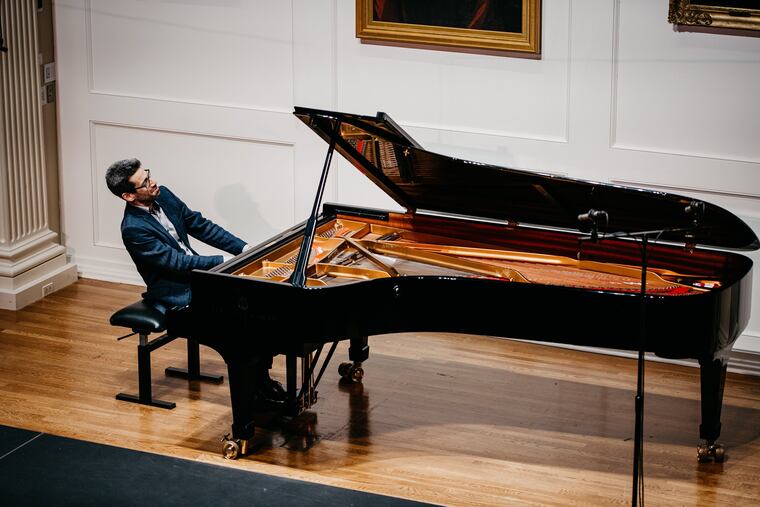Jonathan Biss brings his supercharged pandemic Beethoven to an empty-hall streaming recital in Philly
The performance is another case of a normally compelling performer being more so amid COVID-19, with an extraordinarily magnified musical awareness that makes the music an “essential service.”

The idea of a COVID-era performance practice in classical music began, for me, with Philadelphia-based pianist Jonathan Biss. In late March, which seems like a thousand years ago, he salvaged a live New York piano recital by streaming his supercharged Beethoven from his apartment.
Tuesday, he and Beethoven were back, this time for a streamed Philadelphia Chamber Music Society recital at the American Philosophical Society amid the new lockdown. His energy was tempered but maintained an imperative sense of communication. Rhythms felt nervous. Emphatic bass lines kept the music volatile at its very foundation. Beethoven’s ideas seemed to tailgate each other.
What about this makes it a COVID-19 interpretation? It’s another case of a normally compelling performer being more so, with an extraordinarily magnified musical awareness that makes the music an “essential service.” Other such concerts were Paul Lewis’ super-volatile playing of Beethoven’s Diabelli Variations in a Tanglewood-sponsored streaming in July and Igor Levit’s sharply contoured Bach Partita No. 6 this month from his Berlin home.
Firmly established as a Beethoven specialist from his concerts, recordings, and teaching at the Curtis Institute, Biss played Beethoven’s Sonata in E-flat Major, Op. 7, Sonata in F-sharp Major, Op. 78, à Thérèse, and Sonata in A-flat Major, Op. 110, sequenced in ways that charted the emergence of the composer’s personality — until Op. 110, where he surpassed himself. Behind his highly-focused energy was Biss’ sober analysis (reminiscent of Rudolf Serkin) and sense of finding that crucial “hinge note” that more clearly points the ear into the far-flung directions that the music takes.
Op. 7 — nobody’s favorite though I suppose we should hear it every so often — needed Biss’ extra charge. The composer wasn’t always able to salvage his own unpromising thematic material and tried to get too much mileage out of more promising ideas. One of the shorter sonatas, Op. 78 has a slow introduction, part hymn and part love song, that Biss played with such a heart-melting depth that your ears more enthusiastically embraced what followed.
Beethoven’s majestic, self-probing Op. 110 sonata is better heard on Biss’ thoughtful recording on the Orchid Classics label. Still, Tuesday’s live performance had its own more boldly drawn charisma, with more overt emotionalism that came out of a looser interpretation of the score’s performance markings.
Bass lines, in particular, had a more leonine competition with treble melodies, giving the climax of the sonata’s famous fugue an even greater sense of victory. The sonata’s succession of 13 block-like chords was delivered so insistently, the music seemed to be saying “Don’t give up — on anything.”
Biss’ playing isn’t 100 percent accurate, which reminded you this streaming is indeed a real moment in time rather than some massaged product. Due to current lockdown restrictions, the concert was without audience, but the playing still seemed to address a live audience.
There was also freedom — from distracting audience noise or concern over how the performance is being received. As frustrating as current circumstances can be, the live Beethoven experience is still very much possible.
The Jonathan Biss recital is available free on demand through Friday at pcmsconcerts.org, with donations requested.